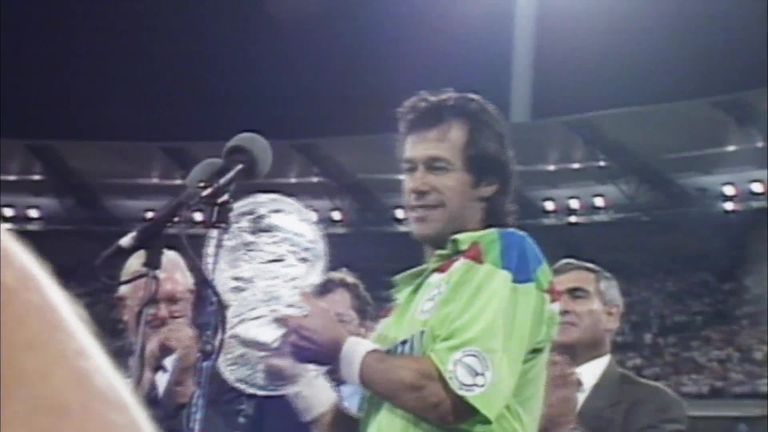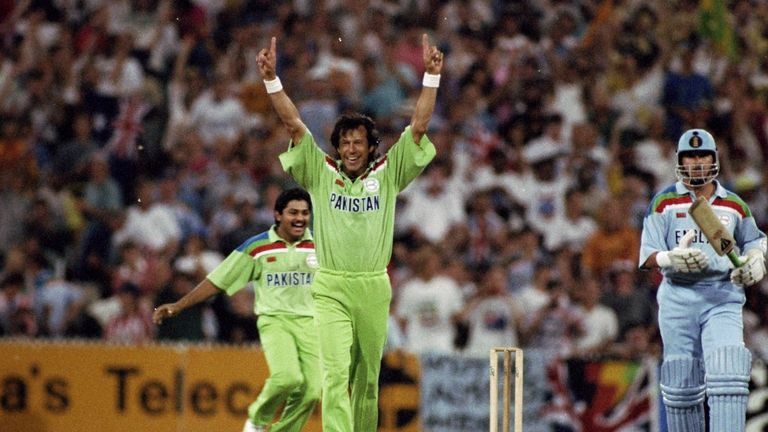Imran Khan: The cricket legend set to lead Pakistan

Thursday 26 July 2018 12:46, UK
Sanya Burgess, news reporter
Pakistan's election on Wednesday saw tens of millions vote in a poll that could drastically change the political landscape of the country.
It was the second time a civilian government has handed power to another since the country became independent in 1947.
But months of violence which have seen hundreds die in a series of terrorist attacks had put this at risk.
The two main candidates were neck-and-neck but, with vote counting still under way, cricket icon-turned-politician Imran Khan, maintained a lead and was itching close to power.
His main opponent - three-time former prime minister Nawaz Sharif, was arrested on corruption charges earlier this month.
A Khan victory would the end of decades of domination by the Bhutto and Sharif families.
Who is Imran Khan?
Born Imran Ahmad Khan Niazi in 1952, he is now known simply as Imran.
The 65-year-old cricket legend stood and was defeated in the 2013 elections, coming third.
Many see this election as his last chance to fulfil his ambition of becoming Pakistan's next prime minister.
He founded the Pakistan Tehreek-e-Insaf party in 1996, with many hailing him as a hero for his sporting prowess and vows to crack down on corruption.
A sporting hero
Mr Khan captained his team to victory in the 1992 cricket World Cup - an achievement that saw the entire country erupt in celebrations of a magnitude rarely seen in Pakistan.
His encouragement to the team that they fight like "cornered tigers" that year has seen the phrase enter sporting mythology.
Despite his cricket career being well in his past, the hashtag #behindyouskipper is one of the highest trending hashtags on social media in Pakistan, attracting messages of support from former international superstars including Wasim Akram and Waqar Younis.
The playboy
Six foot tall, urbane and with a voice that reveals his Oxford education, Mr Khan gained a reputation as a playboy and party animal during his sporting career.
He began to settle down when he married British heiress Jemima Goldsmith (pictured above) in 1995, a year before he founded his political party.
They had two children but divorced in 2004 after nine years together.
His second marriage to journalist and weather presenter Reham Khan lasted 10 months before he reportedly "divorced her by text message" in 2015.
In February this year, he married for a third time - to Bushra Maneka (below), a faith healer who treated him.
The young Imran
Mr Khan says he struggled to make friends when he first arrived in England in 1971. He endured racial slurs but says he was never physically beaten up.
In leaving Lahore, he left behind a childhood spent playing cricket with his four servants and life as a student at Aitchison College, known as the Eton of Pakistan.
He was distant from his father but close to his mother, whose family were known as the godfathers of Lahore Cricket Club - to the point that when people began to call him his mother's family name Khan, rather than Niazi, he let them.
His mother died of cancer in 1985 and he built a hospital in his home city in her honour; he has expanded this to Peshawar and also plans to build one in Karachi.
Politics
Broadly speaking, Mr Khan today is a pragmatist.
He is a political operator who merges conservative views with his history of living a liberal Western lifestyle.
Now a devout Muslim, he has abandoned western dress and is often seen dressed in an immaculate white shalwar kameez.
His conservative views include being critical of feminism and supporting strict blasphemy laws. He speaks of the scourge of “westoxified” elites in Pakistan.
He vows to eradicate corruption from the top of government, to be tough on terror and to fight poverty.
However, when pressed in the media, he rarely goes into detail.
His background of family wealth, being a public personality, railing against liberals and electing himself the voice of the forgotten everyman has prompted The Sunday Times to compare him to Donald Trump - a politician Mr Khan has called "ignorant and ungrateful".
Political controversy
Pakistan's powerful military has been accused of influencing the election to fall in Mr Khan's favour by censoring media coverage.
Some believe if he wins with a slim majority, the army will be able to exercise some power behind the scenes.
Mr Khan was rebuked by some for criticising NATO and has reportedly said the Taliban should be allowed to open an office in Pakistan to facilitate peace talks.
Meanwhile, he has also been the subject of a #MeToo claim in Pakistan.
His accuser, Ayesha Gulalai Wazir, is an MP from his own party. She alleges he sent her "inappropriate" text messages and has called for a parliamentary investigation.
He has denied the allegation.








